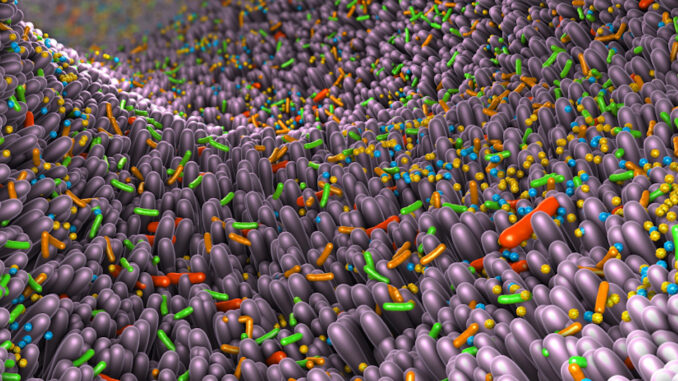
Consuming high amounts of dietary fiber is beneficial for health, and recent nutrition research has shown that the benefits of some dietary fibers are attributable to the gut microbiota. When these fibers are consumed by humans, they reach the colon intact and are broken down by gut microbes to produce health-benefitting molecules such as butyrate. And while many people know they should increase their intake of dietary fiber to reach the daily recommended amount, not all sources of fiber are tasty and appealing. Nor do all types of dietary fiber have the same impact on the human gut microbiota.
Could the health of the population be improved if a broader range of appealing foods were available to modulate the gut microbiome in a health-promoting manner?
Researchers at the University of Nebraska – Lincoln are addressing this question by bringing together the fields of microbiome research and plant breeding. In a recent paper published in the journal Frontiers in Microbiology, they demonstrate how a tasty food with unique nutritional properties—a new variety of popcorn—can have positive impacts on the gut microbiome.
PhD student Nate Korth, who led the research, studied a new popcorn variety developed by Prof. David Holding. The popcorn variety was developed using a trait called ‘quality protein’ originally discovered in dent corn. Corn protein is normally deficient in some amino acids our bodies require – lysine and tryptophan – but quality protein corn carries naturally occurring variation in several genes that increase the abundance of these two amino acids. Holding bred this trait into popcorn, producing new and nutritionally distinct popcorn varieties with more balanced plant protein.
Korth says,
“We chose popcorn because we wanted to know if we could use conventional breeding to work toward better nutrition by focusing on something that people consume easily, readily, and in large quantities. Popcorn is a snack that is enjoyed around the world.”
The scientists used a specially developed laboratory model of digestion, with gut microbial communities collected from four healthy human subjects, to find out which bacteria would grow and thrive in the guts of people consuming Holding’s new popcorn variety compared with typical popcorn. While the new popcorn variety had slightly different effects on each donor’s gut bacteria, overall it stimulated the growth of bacteria genetically equipped to produce butyrate. These bacterial taxa primarily belonged to the family Lachnospiraceae, including the genera Coprococcusand Roseburia.
They backed up this observation by measuring butyrate directly in each microbial community. Korth found that where the abundance of butyrate-producing bacteria increased, the abundance of butyrate itself also increased.
Butyrate is linked with numerous beneficial health effects in humans, including a healthy gut lining, immune system regulation, metabolic health, and even regulation of appetite via the gut-brain axis.
“It’s most likely a network of interactions that allow the quality protein popcorn to stimulate this short-chain fatty acid pathway,”
says Korth.
He did additional experiments to demonstrate that it was the increased lysine content of the new seed protein that specifically that stimulated bacterial growth and butyrate production upon consumption of the popped corn.
“Previous studies have shown the effect of proteins on the gut microbiome is not always positive. But we showed that the protein in the popcorn did have beneficial effects compared to traditional varieties of popcorn. We have much more to learn about protein and the gut microbiome, but this gives us clues to how we can use diet to improve the health of people who are already generally healthy,” he says.
He adds that a next step would be to follow up with a clinical study, to show the butyrate-enhancing popcorn improves health in humans.
He says,
“The goal is to develop new varieties of staple crops that have ‘prebiotic’ potential; ones that promote the growth of health-associated bacteria and the production of health-benefiting molecules like butyrate. I don’t think we’ll ever make a popcorn that’s as good as, say, spinach for your microbiome. But the average American eats more than 50 quarts of popcorn a year, so healthier varieties of popcorn could make a big positive impact without having to convince people to change the ways they eat.”
“The same strategy we used for popcorn can also work for wheat, and rice, and beans, and lots of other crops people already eat every day,” says Korth, “By measuring and thinking about the impact of crop varieties on the human gut microbiota, we can start to feed some of the important bacteria that are going un-fed in people’s guts today.”


